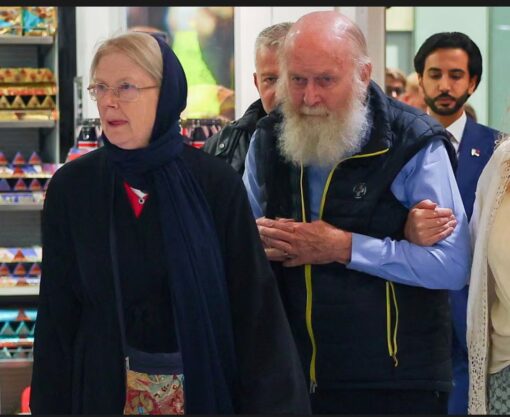Peter and Barbie Reynolds, a British couple aged 80 and 76 respectively, have returned to the UK after enduring nearly eight months of detention in Afghanistan, where they feared for their lives and faced the constant threat of execution.
Their release, facilitated by Qatari diplomatic efforts, has shed light on the harrowing conditions they endured and the broader implications for foreign nationals in Taliban-controlled Afghanistan.
Arrest and Detention
The couple, who had lived in Afghanistan for 18 years, were arrested on February 1, 2025, in Bamyan province. Despite running a charitable, Taliban-approved training program through their organization, Rebuild, they were detained without explanation.
Their American friend, Faye Hall, and a local Afghan translator were also arrested. Hall was released in March following Qatari-led negotiations, but the Reynolds remained incarcerated under harsh conditions.
During their detention, the couple was held in multiple prisons, including the notorious Pul-e-Charkhi facility in Kabul. They were subjected to solitary confinement, inadequate food, and denied access to necessary medical care.

Peter Reynolds, who requires heart medication, was reportedly denied his medication, leading to concerns about his health. Barbie Reynolds suffered from anemia and malnutrition due to poor prison conditions.
Fear of Execution
In their first interview since their release, the Reynolds expressed their profound fear during their captivity. Peter Reynolds stated, “we began to think that we would never be released. We feared for our lives every day.” Barbie Reynolds echoed these sentiments, adding, “there were times when we thought we would be executed.”
The couple’s ordeal highlights the precarious situation of foreign nationals in Afghanistan, where legal processes are often opaque and arbitrary.
Diplomatic Efforts and Release
The Reynolds’ release was secured through extensive diplomatic efforts, primarily led by Qatar. Given the UK’s limited diplomatic presence in Afghanistan following the Taliban’s resurgence, Qatar played a crucial role in mediating between the British government and the Taliban.
The Qatari government facilitated medical assistance for the couple and arranged for their safe passage out of Afghanistan.
Upon their release, the Reynolds were flown to Doha for medical evaluations before returning to the UK. They were reunited with their family, expressing immense relief and gratitude for the international efforts that secured their freedom.
Legal and Humanitarian Concerns
The circumstances surrounding the Reynolds’ detention raise significant legal and humanitarian concerns. The Taliban claimed that the couple violated Afghan laws but did not specify the charges against them.
This lack of transparency and accountability underscores the challenges faced by foreign nationals in Afghanistan, where the rule of law remains inconsistent and often disregarded.
Human rights organizations have condemned the Reynolds’ treatment, describing their detention as arbitrary and inhumane. The United Nations and various NGOs have called for greater protection of foreign nationals and adherence to international human rights standards by the Taliban authorities.
Broader Implications
The Reynolds’ case highlights the broader implications for foreign nationals in Afghanistan under Taliban rule. While some foreign aid organizations continue operations in the country, the safety and security of their personnel remain a significant concern.
The arbitrary detention of the Reynolds serves as a stark reminder of the risks faced by foreigners working in Afghanistan and the unpredictable nature of the Taliban’s legal and judicial processes.
Furthermore, the international community’s response to such incidents remains critical. Diplomatic efforts, like those led by Qatar, are essential in securing the release of detained individuals and ensuring their safety.
However, these efforts also underscore the necessity for broader international engagement and pressure on the Taliban to uphold human rights and the rule of law.
Personal Reflections
Despite their harrowing experience, the Reynolds expressed a deep connection to Afghanistan and its people. Peter Reynolds remarked, “Afghanistan has been our home for nearly two decades. We have always sought to help its people, especially women and children.”
Barbie Reynolds added, “We hope to return one day, but for now, we are focusing on our health and family.”
Their story serves as a poignant reminder of the complexities and challenges faced by foreign nationals in conflict zones. It also underscores the resilience and dedication of individuals committed to humanitarian work, even in the face of adversity.


